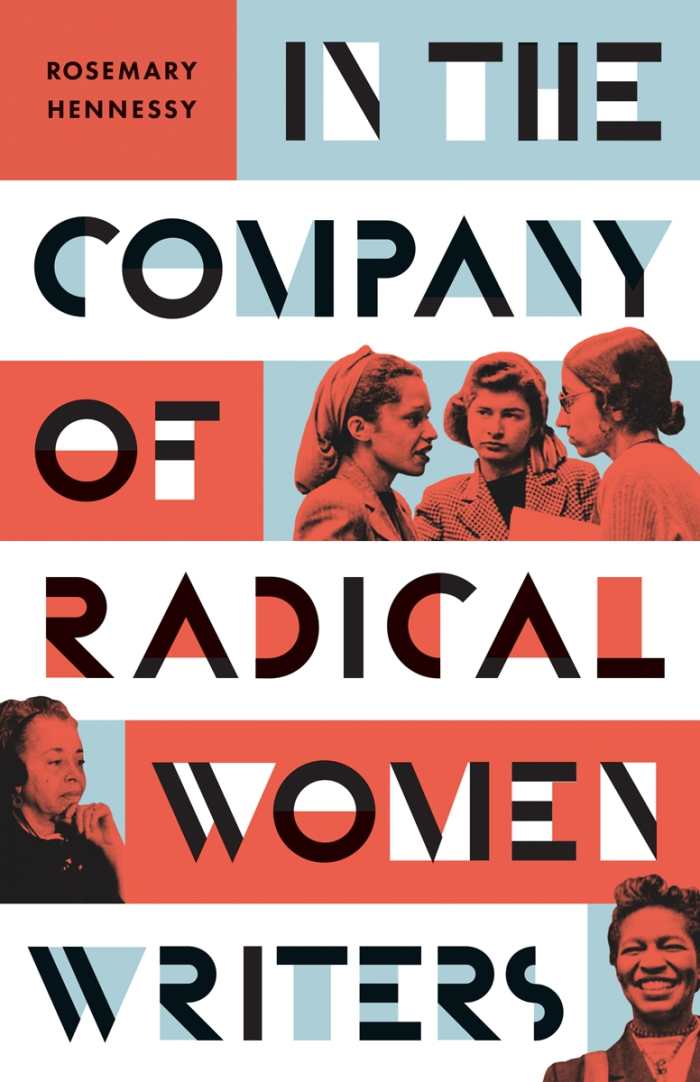Book of the Day Roundup: August 21-25, 2023
In the Company of Radical Women Writers

Rosemary Hennessy
University of Minnesota Press
Softcover $24.95 (304pp)
978-1-5179-1490-5
Buy: Local Bookstore (Bookshop)
In Rosemary Hennessy’s immersive book, seven singular authors are analyzed in terms of their unconventional lives and literary works.
Drawing social crisis parallels between the 2020s and the Great Depression, this book unearths the creative output and activism of women writers who were suppressed and blacklisted because of their ties to the Communist Party. It first covers four Black writers who worked in Harlem, advocating for domestic workers and pressing party leaders to consider gender and race issues. Their work proves fascinating: Marvel Cooke exposed the Bronx “slave market” for domestic workers; Louise Thompson championed the case of the Scottsboro Boys, who were accused of raping a white woman, with brilliance; Claudia Jones’s advocacy for Black women’s rights was uncompromising; and Alice Childress’s extensive, multi-genre oeuvre criticized all political factions of undervaluing Black women’s work and lives.
The book then shifts to cover Midwestern writers Josephine Herbst and Meridel Le Sueur, who wrote about the exploitation of the environment and Indigenous people. And New York City native Muriel Rukeyser wrote about love as an essential, life-giving, creative force; these themes ran through her poetry, activism, and personal life.
Its concepts complex, this feminist, Marxist work discusses how the concept of race evolved as a “cultural institution invented to protect the accumulation of wealth” and demonstrates how whiteness and patriarchy evolved throughout American history. Both were used to protect the political and economic power of elite white men, Hennessy shows, contradicting ideals of equality and democracy. Her book is also compelling in deconstructing interpersonal tensions, as between immigrant groups; between Black people and Jewish people; and between factions of the Left.
In the Company of Radical Women Writers is significant; it covers 1930s literary history, the civil rights and women’s rights movements, and the under-heralded work of seven powerful writers.
RACHEL JAGARESKI (June 27, 2023)
Savage Bred

Victoria McCombs
Enclave Escape
Hardcover $24.99 (256pp)
979-888605062-2
Buy: Local Bookstore (Bookshop)
In Victoria McCombs’s high seas adventure novel Savage Bred, betrayal and family sail hand-in-hand.
As the third book of the Royal Rose Chronicles starts, Ontario, the pirate ship’s former first mate, has become captain; the previous captain, Arn, had his fealty sold to a king; Emme is regaining her strength from a life-sapping curse; and Queen Isla has declared war on all pirates. Separated and pining for each other, Emme and Arn are caught in the intricate dances of broader conflicts.
The Royal Rose becomes a haven for Emme and her brother Emric, who are unaware that power-hungry Ontario betrayed Arn. At the same time, the siblings’ mother, Arabella the Ruthless, hopes to rule the seas with her children; her sense of care for them is callous and manipulative. Then the crew of the Royal Rose offers Arabella to Queen Isla in exchange for their own safety; Ontario plays both sides, and his political and personal motivations intertwine.
In this series volume, past tragedies come to the fore as well. Arn’s violent obedience as a former royal soldier threatens his standing with a new crew, and echoes of the difficult circumstances that reunited Emric and Emme are affecting and germane. And when Emric’s past lover, the mermaid Coral, shows up injured, the fallout is heartbreaking.
This continuing story, which takes place on a stage of oceanic proportions, is thrilling: Arabella’s whereabouts are ever-changing, and Ontario’s motivations are shrouded in mystery. For many of the characters, the prospect of ruling the sea as a ship captain rises above all other concerns. Still, there are consequences to seeking power, including among one’s family members (found and otherwise); destiny sometimes intervenes.
In the fantasy novel Savage Bred, piracy seems like a romantic lifestyle, but it’s also a corrupting one.
ALI ORTIZ (August 21, 2023)
Sordidez

E.G. Condé
Stelliform Press
Softcover $15.99 (141pp)
978-1-77768-236-1
Buy: Local Bookstore (Bookshop)
Indigenous culture is at war with imperialism in E. G. Condé’s haunting novella Sordidez.
In a future ravaged by climate disaster and biochemical warfare, Puerto Rico is caught in the new cold war between China and the United States and abandoned by both. Its inhabitants return to their old ways deep in the mountains. And while the verdant green of Mexico is turned to desert and ash by a vicious, anti-Indigenous tyrant, in the Mayan ruins, something that has slumbered for half a millennium is stirring.
Vero, a trans man, becomes the leader of a small group of survivors eking out an existence in Puerto Rico. Bolstered by his grandfather’s stories, he and his sisters use the Taino Arawak language to communicate, building a grassroots resistance movement. In Yucatán, Doña Margarita sows and tends to a garden of plants and people devastated by human-made pestilence and plague. Her path was chosen as a means of survival and forgiveness for the regime that tore her family apart.
Evocative and descriptive, the language captures the lushness of Puerto Rico and the devastation of the desiccated Yucatán peninsula. It is dreamy and vengeful, a character unto itself. It is also multilingual, highlighting words and phrases from Arawak and Mayan languages.
Vero and Doña Margarita’s stories, told in alternating chapters, converge in ways that have far-reaching consequences. Though changed as a result of war, climate change, and the politics of peace, the issues that led society to destruction are pervasive. Vero and Doña Margarita illustrate two ways of resistance and coping with and overcoming trauma. But the imperialist history of the region looms. The past is never forgotten, and the future is uncertain.
At its heart, Sordidez is a clarion call to recognize that the political and biological ecosystems of the world are intertwined.
DONTANá MCPHERSON-JOSEPH (June 27, 2023)
Grandpa and the Kingfisher

Anna Wilson
Sarah Massini, illustrator
Nosy Crow
Hardcover $17.99 (32pp)
979-888777017-8
Buy: Local Bookstore (Bookshop)
Delicate watercolor illustrations depict the cycle of the seasons and the circle of life in this touching story about the inevitable and essential nature of death. A young child spends one final summer with their grandfather, who gently guides them to understand and accept death—and the new life it brings—by observing a family of kingfishers nesting on the river that flows by his home. In the end, the child understands that “Nature goes on forever.”
DANIELLE BALLANTYNE (June 27, 2023)
Ravage & Son

Jerome Charyn
Bellevue Literary Press
Softcover $17.99 (288pp)
978-1-954276-19-2
Buy: Local Bookstore (Bookshop)
Jerome Charyn’s rollicking novel Ravage & Son tours the seedy underbelly of turn-of-the-century New York City.
Between 1883 and 1913, the city’s Jewish quarter witnesses the reign and fall of Lionel Ravage, a hardware and property magnate. Though his mistresses and unacknowledged children are legion, his only love is Manya, the daughter of a Lithuanian scholarly tenant. Their illegitimate son, Ben, grows up to be a detective and protégé of Jewish Daily Forward journalist Abraham Cahan. Both men resolve to expose the city’s corruption and criminality; meanwhile, Ben takes on a missing persons case.
With clear images of immigrants’ tenement living, this is a true “panorama of human flesh.” There are prostitutes, criminals, opium addicts, peddlers, and scavengers. Among the memorable characters are gang leader Monk Eastman and Clara Karp, a Ukrainian refugee actress who performs as Hamlet with lines in Yiddish and English. There are also cameos by Henry James—in a standout chapter, “The Master,” Cahan accompanies the novelist on a trip to Ellis Island—and atmospheric mentions of cultural landmarks like the Ziegfeld Follies and Woolworth’s stores.
The realistic presentation of racism at the time extends as far as the language: “fagin” and “shylock” are employed as generic terms for pickpockets and moneylenders. However, the addition of a lesbian couple is a progressive choice. Outmoded vocabulary (“The Shilly-Shally Saloon,” “vagabondage,” “jackanapes”) enhances the authenticity of the time period. And although “Ravage” is a key surname, it appears in clever metaphorical usage as well, in reference to sexual despoiling and suggesting an overall threat of ruin. In contrast to the often squalid details of ghetto life is the tenderness of Lionel’s recurring grief for Chlöe, his murdered cat.
An entertaining historical romp, Ravage & Son brings New York City’s criminal underground to vibrant life.
REBECCA FOSTER (August 21, 2023)
Barbara Hodge
